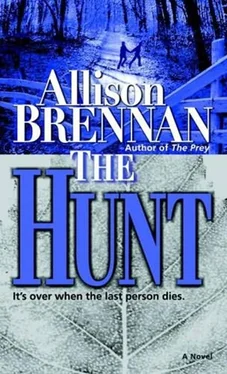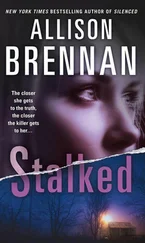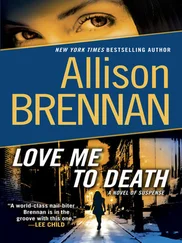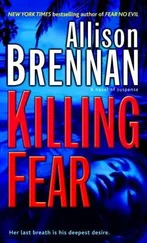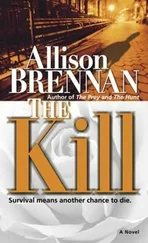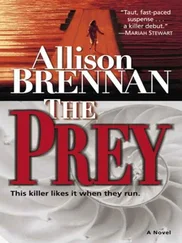Miranda’s excitement grew as everything suddenly became clear to her. “She didn’t run long. She couldn’t have. He wouldn’t have risked it, not when it was getting dark and the rain was heavy. Which means the cabin is nearby. It has to be!”
Quinn stared at her for a long moment. Would he disagree with her? She couldn’t believe it. She knew this land like the back of her hand, understood how the Butcher thought. How he lived for the hunt more than the rape. Yet he’d never given any of them a lot of lead time. Two minutes. He’d told her and Sharon two minutes and then they were fair game.
She was about to demand that Quinn come up with a better plan, relying on her experience and training to argue her point, when he said, “All right.”
Before he could change his mind, she smiled and said, “Follow me.” She stepped off the narrow trail and cut through thicker trees and growth.
Quinn’s training told him Miranda was probably right. It was a good call and confirmed that-as least as far as the search was concerned-Miranda would be more help than hindrance.
The air was cooler, more humid, and darker in the middle of the forest. The dank smell from the recent storm made Quinn think of life and death, as if the forest had been reborn in the wash of the rain.
If they found the cabin Rebecca was kept in, they might find evidence to lead them to the Butcher. He’d been too elusive for years, no pattern to the abductions, except that he hit during spring. April. May. June.
Twelve years ago they hadn’t recognized a pattern. When Miranda and Sharon were abducted, the time of year didn’t seem to hold any significance. But when Quinn’s partner Colleen Thorne investigated the Denver sisters’ abduction three years ago, the spring pattern seemed obvious. Every known Butcher victim had disappeared in the spring.
They’d consulted with Hans Vigo, the FBI’s key profiler, who said either the season held special significance to the killer or something in his job or personal life prevented him from killing the rest of the year.
Or, it could simply be convenience. Montana’s hunting season was predominantly during the fall months. Accidental discovery would be less likely in the spring, when legitimate hunters weren’t out searching for game.
But the key to the psychology of this particular serial killer, Vigo said, was that he needed total control. When Quinn questioned why he gave up the control to give the women lead time to escape, Vigo reminded him that the women had no control. They were naked, injured, weak from minimal food and water, and the two-minute lead time was a ruse. He could easily catch up to them, staying back just far enough so they thought they could get away, and when he tired of the hunt, he’d move in for the kill.
“This is the only aspect of his life that he has control of,” Vigo said. “Remember that. When you find him, you’ll learn he has no control over his life or his job.”
For example, Vigo said, as a child the killer would have been subject to a domineering, abusive parent. The abuse was likely both physical and mental, and if he fought back, the punishment for his disobedience would have been severe. He likely was restrained in some manner as a child, either locked in a small room or tied up.
He’d have a job that didn’t necessitate a lot of contact with the public. On the surface he would be able to function normally and there wouldn’t be any indication of the evil that lurks in his soul, but he wouldn’t do well in situations where he had constant communication with people.
The Butcher wouldn’t have a lot of control over his career, but that was largely of his own making. He would be relegated to low-level employment because of his inability to associate with people on a day-to-day basis. He might have a rote position, such as in a factory where he repeats the same tasks, leading to frustration because he has above-average intelligence. He could very well work outdoors-in construction for example, moving from job site to job site and not developing any close relationships with fellow workers.
They’d never had a suspect. Every time an MSU woman disappeared, her boyfriends, ex-boyfriends, and college professors were interviewed and dismissed as viable suspects. The killer was someone of above-average physical strength, great patience, and superior knowledge of the wilderness between Bozeman and the northern boundary of Yellowstone National Park. He knew where every hunting shack was located, every abandoned cabin, all the places he could imprison one or two women for a week to torture and rape them at his leisure.
No one they’d interviewed fit that profile.
Quinn admired Miranda’s thought process. But of course, he’d never doubted her intelligence. She used a combination of common sense, knowledge, and instinct that guided her in the right direction most of the time.
He bit his tongue, loath to admit he still had feelings for Miranda. Hell, he thought about her all the time. In his weakest hours, the time between midnight and dawn, when his resolve to put her aside wavered and he remembered how she looked, how she tasted, how she smiled at him when he held her.
He didn’t know when he’d fallen in love with her. When he’d visited that first Saturday after the Butcher investigation fell apart for lack of evidence, he knew he’d be coming back to Montana every free moment. At least once a month he spent a weekend with her. He didn’t rush her, couldn’t rush her, but together they formed a bond he’d never thought he’d wanted to find.
Even now, ten years later, he realized he’d never severed what united them. He was still drawn to Miranda. Why had he recommended her to the Academy in the first place? If he’d only encouraged her to wait, to give her career choices more time to develop, to think about what she truly wanted, everything that came after would have been avoided. He wouldn’t have had to hurt her.
And maybe they would still be together.
He’d believed for the longest time that she would come back to him. Their love, he thought, was unbreakable.
He was wrong. She’d never sought him out, never tried to listen to his reasons, and instead she’d turned to Nick.
Quinn shook off his frustrations. No sense thinking about the if-onlys and what-might-have-beens. He made the most difficult decision in his life ten years ago; he now had to live with the consequences.
He allowed Miranda to lead, not admitting he felt a little out of sorts unable to see the sky. Shadows surrounded them, making it difficult to know in which direction they were headed. He was almost certain they were still moving northeast. But “almost” could get them lost.
He had to trust that Miranda knew how to get them out of here.
Forty minutes passed and Quinn was ready to turn back when suddenly they stepped into a clearing, the sun a welcome sight.
Ponderosa pines, thirty to forty feet tall, grew evenly spaced as far as he could see. Miranda’s excitement was palpable.
“Follow me,” she said, gesturing impatiently. “We’ll find the entrance to the path and backtrack.”
They skirted the edge of the clearing, and about two hundred feet away they found it.
Quinn bent to examine the deep impression in the soil. The long gouge in the earth testified that Rebecca had fallen to her knees. A small sapling was bent. Had she pulled herself up?
Now he knew the killer had come this way. The growth was too thick to effectively track his victim unless he had used the same path she did. He photographed the evidence, then glanced up.
Miranda was gone.
The hair rose on the back of Quinn’s neck. Where was Miranda?
He called out her name. He stood, looking for her, pulling his Sig Sauer from his holster, braced for anything that might happen.
Читать дальше
